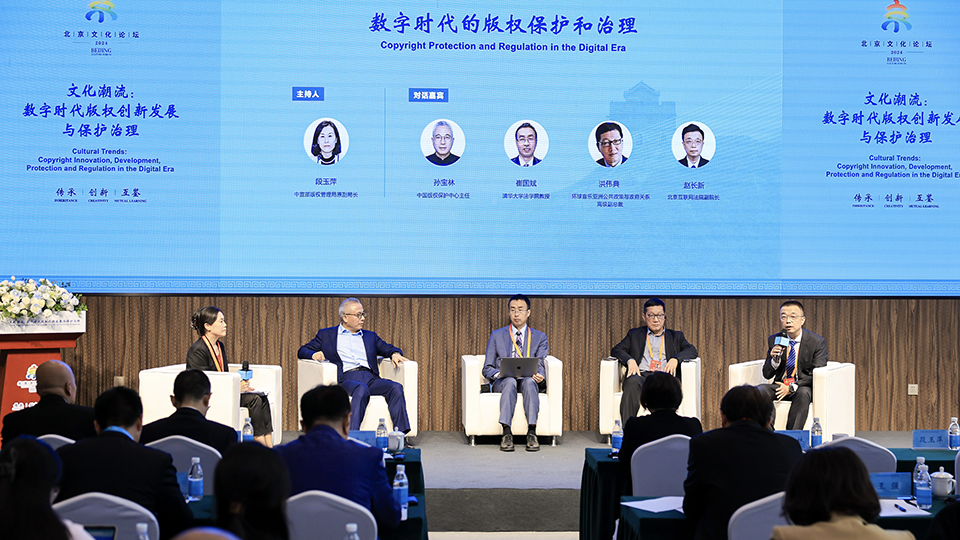WIPO China:Copyright Drives the Thriving Development of the Cultural and Creative Industries in the Digital Era
September 26, 2024
Beijing, September 20 – The professional salon, themed "Cultural Trends: Copyright Innovation, Development, Protection and Regulation in the Digital Era," part of the 2024 Beijing Culture Forum, was successfully held in Beijing. Ms. Liu Hua, Director of the WIPO Office in China (WOC), and Mr. Wang Zhicheng, Director General of the Copyright Department of the Publicity Department of the CPC Central Committee, attended the event and delivered speeches.
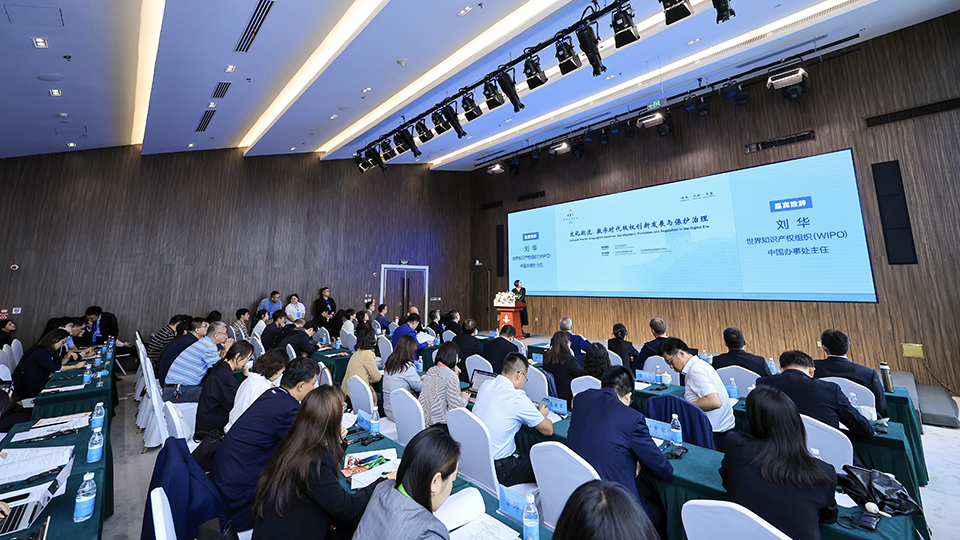
In her speech, Ms. Liu emphasized that against the backdrop of the digital age, the World Intellectual Property Organization (WIPO) is actively leveraging the power of cutting-edge technological developments to promote the continuous improvement of the global intellectual property protection and governance system. As early as in the Global Innovation Index Report released in 2022, WIPO had pointed out that the world is currently undergoing the profound influence of two major innovation waves: one is the digital innovation wave led by digital technologies such as artificial intelligence and blockchain, and the other is the innovation wave in deep science fields including biotechnology and nanotechnology. These two waves are profoundly reshaping human production, lifestyles, and even entertainment experiences at an unprecedented pace.
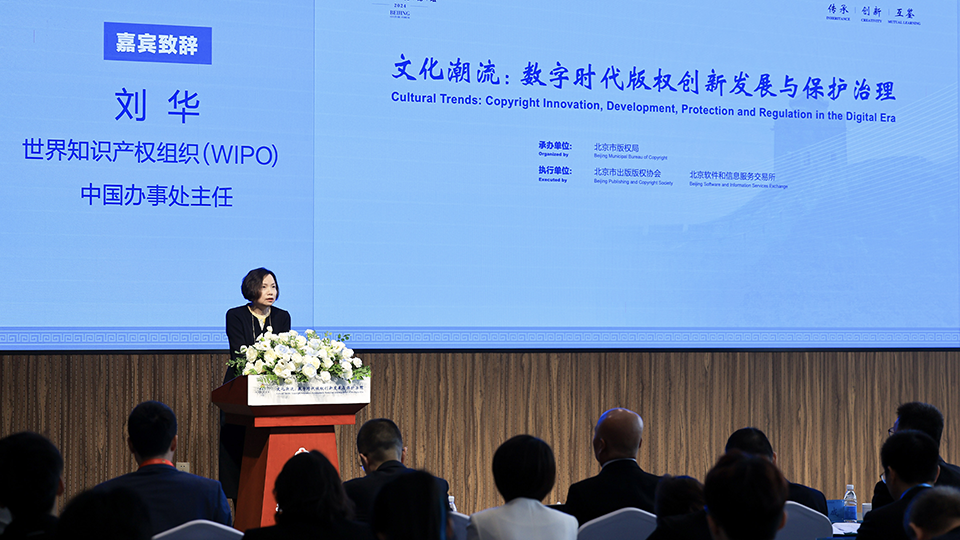
Driven by the wave of innovation, China's cultural and creative industry has demonstrated robust competitiveness and influence. The emergence of creative products such as "Black Myth: Wukong" is not only a vivid demonstration of China's cultural innovation strength but also proof of a significant enhancement in China's global influence and technological innovation capabilities in terms of copyright protection. These works, with their unique creativity and exquisite craftsmanship, showcase the profound heritage and boundless innovative vitality of Chinese culture to the world.
Ms. Liu pointed out that in the field of copyright governance and innovative development in the digital age, WIPO focuses on four key directions of advancement. Firstly, WIPO will continue to deepen its cooperation with China, support China's active role in international copyright norm-setting and traditional culture protection, and encourage more representatives from China to participate in the "WIPO Conversation on IP and Frontier Technologies," sharing valuable experiences and unique insights.
Secondly, through diverse initiatives such as World IP Day, WIPO Global Awards, and Global Innovation Index, WIPO will continue to disseminate China's success stories in IP, with particular attention to the contributions and potential of small and medium-sized enterprises, women, and youth in innovation and creativity. For instance, Beijing Healinno Tech Company has been honored with the 2024 WIPO Global Award for its remarkable achievements in surgical robotics technology and efficient IP management. Tianjin youth Lu Wenhui's video work, "The Hope of Woodblock Inheritance in New Year Paintings," focusing on Xi Wang, the inheritors of the intangible cultural heritage of Yangliuqing Woodblock New Year Paintings, successfully made it into the top 25 of the 2024 World IP Day Video Competition. Professor Gong Qin from Tsinghua University received the 2024 WIPO Best Woman Inventor Award for her tinnitus diagnosis, treatment, and evaluation platform.
Thirdly, WIPO is committed to further optimizing the global service system for patents, trademarks, designs, geographical indications, and arbitration and mediation, providing efficient and convenient IP services to stimulate the vibrant innovation ecosystem in China. In addition to existing online services such as ePCT, eMadrid, and eHague, WIPO is actively exploring the application of blockchain technology in the "Global Identifier Project" (GID), aiming to identify a natural person or a legal entity uniquely, consistently, accurately and securely across IP systems and jurisdictions, facilitating global intellectual property searches and management.
Lastly, WIPO focuses on developing and promoting IP policy tools that drive economic growth and social development. By expanding the reach of WIPO GREEN (the Marketplace for Sustainable Technology) and TISC (Technology and Innovation Support Centers), and deepening the impact of WIPO Summer Schools and Joint Master's Programs in China, WIPO also promotes the IP Diagnostics Tool (an AI-powered IP diagnostic tool) and CLIP platform, empowering SMEs, women, and young innovators to leverage IP to enhance their skills and contribute to economic prosperity and sustainable social development.
Ms. Liu further stated that as an important bridge and link for WIPO in China, the WOC will spare no effort in promoting China's deep cooperation and innovative development in the international copyright field, working together with all parties to build an IP ecosystem that safeguards the interests of all parties while promoting innovation, creativity, and sustainable development.
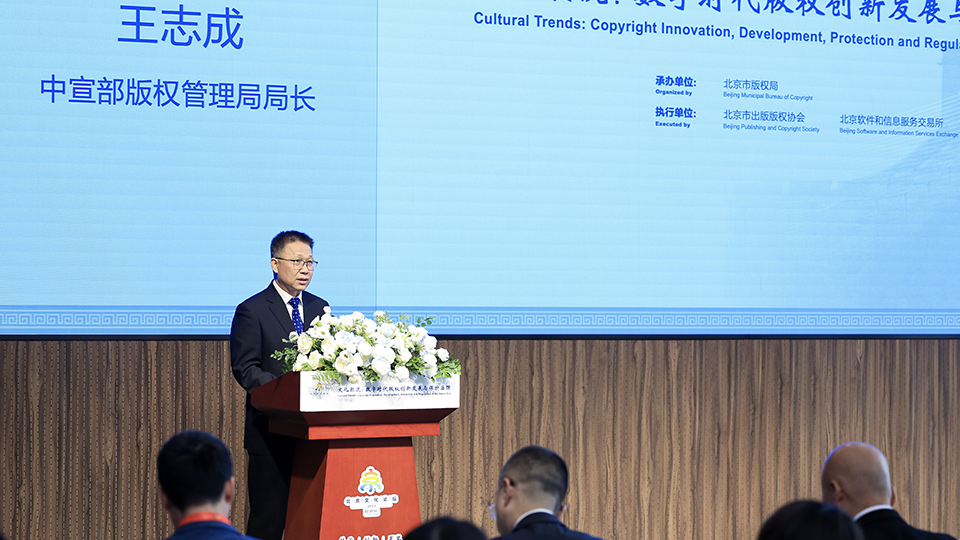
In his speech, Mr. Wang emphasized that the copyright industry, as an important sector of new quality productive forces, plays a pivotal role in promoting the deep integration of culture and economy and accelerating social progress, and is becoming a new engine and driving force for economic development. With the surging tide of digitization and informatization, frontier technologies such as big data and blockchain are increasingly infiltrating into the copyright field, injecting strong impetus into copyright protection and innovative development.
Faced with this situation where opportunities coexist with challenges, Mr. Wang put forward three suggestions: Firstly, efforts should be made to actively drive the innovative application of new technologies in the copyright sector, empowering copyright protection through technological advancements. Secondly, there is a need to continually refine the construction of the copyright protection system, providing a robust legal foundation for the copyright industry. Thirdly, concerted efforts should be directed towards fostering a harmonious environment of social co-governance, uniting diverse forces to jointly safeguard the copyright ecosystem. He called for leading with new-quality productive forces to promote the high-quality development of the copyright industry, continuously improving the modernization level of the copyright governance system, promoting the formation of a social co-governance pattern, and making greater contributions to the prosperous development of cultural undertakings.
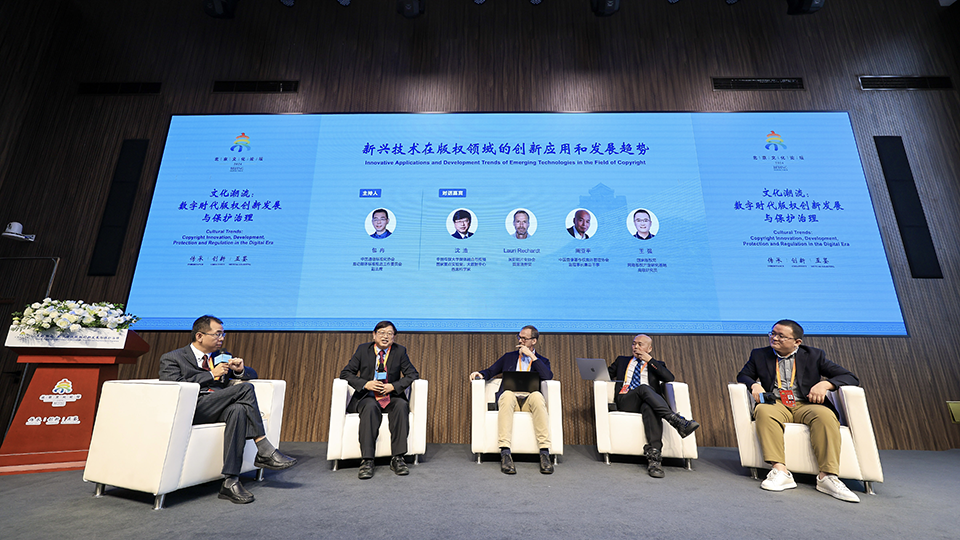
During the panel discussions, panelists engaged in a profound exploration of the innovative applications of digital technology in the copyright sector and related protection issues. They acknowledged that as the digital wave advances, artificial intelligence and blockchain technologies have introduced new opportunities for the creation and protection of copyrighted works, fostering a thriving environment for creativity and reinforcing protection measures. Nonetheless, the rapid evolution of digital technologies has also posed fresh challenges to copyright governance, necessitating continuous adaptation and innovation to address them effectively.
This event, hosted by the Beijing Municipal Copyright Bureau, brought together representatives from government administrative departments, judicial authorities, legal circles, and the industry. They indulged in profound exchanges and discussions centered on pivotal topics such as how cutting-edge technologies can stimulate innovation and creativity within the copyright industry, how to promote the establishment of a more efficient and time-responsive copyright governance system, and how to achieve a delicate balance between technological innovation and rights protection.
